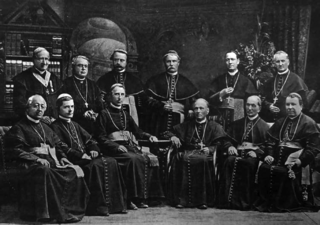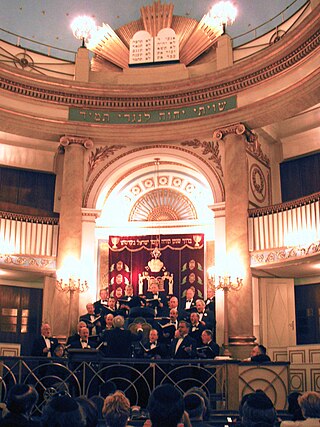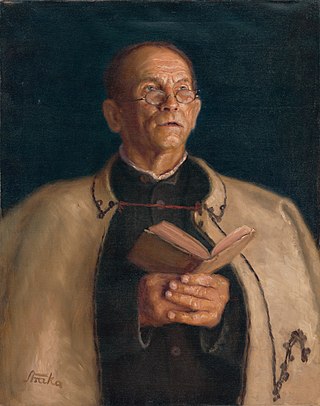Related Research Articles

Conservative Judaism is a Jewish religious movement that regards the authority of Jewish law and tradition as emanating primarily from the assent of the people through the generations, more than from divine revelation. It therefore views Jewish law, or Halakha, as both binding and subject to historical development. The conservative rabbinate employs modern historical-critical research, rather than only traditional methods and sources, and lends great weight to its constituency, when determining its stance on matters of practice. The movement considers its approach as the authentic and most appropriate continuation of Halakhic discourse, maintaining both fealty to received forms and flexibility in their interpretation. It also eschews strict theological definitions, lacking a consensus in matters of faith and allowing great pluralism.

Judaism is an Abrahamic, monotheistic, and widely an ethnic religion. It comprises the collective spiritual, cultural, and legal traditions of the Jewish people, having originated as an organized religion in the Middle East during the Bronze Age. Contemporary Judaism evolved from Yahwism, the cultic religious movement of ancient Israel and Judah, around the 6th/5th century BCE, and is thus considered to be one of the oldest monotheistic religions. Religious Jews regard Judaism as their means of observing the Mosaic covenant, which was established between God and the Israelites, their ancestors. Along with the Samaritanism, Judaism is one of the two oldest Abrahamic religions.

Reform Judaism, also known as Liberal Judaism or Progressive Judaism, is a major Jewish denomination that emphasizes the evolving nature of Judaism, the superiority of its ethical aspects to its ceremonial ones, and belief in a continuous revelation which is closely intertwined with human reason and not limited to the theophany at Mount Sinai. A highly liberal strand of Judaism, it is characterized by little stress on ritual and personal observance, regarding Jewish law as non-binding and the individual Jew as autonomous, and by a great openness to external influences and progressive values.

Women in Judaism have affected the course of Judaism over millenia. Their role is reflected in the Hebrew Bible, the Oral Law, by custom, and by cultural factors. Although the Hebrew Bible and rabbinic literature present various female role models, religious law treats women in specific ways. According to a 2017 study by the Pew Research Center, women account for 52% of the worldwide Jewish population.

Clergy are formal leaders within established religions. Their roles and functions vary in different religious traditions, but usually involve presiding over specific rituals and teaching their religion's doctrines and practices. Some of the terms used for individual clergy are clergyman, clergywoman, clergyperson, churchman, ecclesiastic, and cleric, while clerk in holy orders has a long history but is rarely used.
A rabbi is a spiritual leader or religious teacher in Judaism. One becomes a rabbi by being ordained by another rabbi—known as semikha—following a course of study of Jewish history and texts such as the Talmud. The basic form of the rabbi developed in the Pharisaic and Talmudic eras, when learned teachers assembled to codify Judaism's written and oral laws. The title "rabbi" was first used in the first century CE. In more recent centuries, the duties of a rabbi became increasingly influenced by the duties of the Protestant Christian minister, hence the title "pulpit rabbis", and in 19th-century Germany and the United States rabbinic activities including sermons, pastoral counseling, and representing the community to the outside, all increased in importance.

A hazzan or chazzan is a Jewish musician or precentor trained in the vocal arts who leads the congregation in songful prayer. In English, this prayer leader is often referred to as a cantor, a term also used in Christianity.

Jewish Renewal is a Jewish religious movement originating in the 20th century that endeavors to reinvigorate modern Judaism with Kabbalistic, Hasidic, and musical practices. Specifically, it seeks to reintroduce the "ancient Judaic traditions of mysticism and meditation, gender equality and ecstatic prayer" to synagogue services. It is distinct from the baal teshuva movement of return to Orthodox Judaism.
Alleluia is a phrase in Christianity used to give praise to God. In Christian worship, Alleluia is used as a liturgical chant in which that word is combined with verses of scripture, usually from the Psalms. This chant is commonly used before the proclamation of the Gospel. In Western Christianity, congregations commonly cease using the word Alleluia during the period of Lent but restore it into their services at Easter. The form of praise "Alleluia" is used by Christians to thank and glorify God; it finds itself present in many prayers and hymns, especially those related to Eastertide, such as "Christ the Lord is Risen Today".
Jewish leadership has evolved over time. Since the destruction of the Second Temple in Jerusalem in 70 CE, there has been no single body that has a leadership position over the entire Jewish diaspora. Various branches of Judaism, as well as Jewish religious or secular communities and political movements around the world elect or appoint their governing bodies, often subdivided by country or region.
A precentor is a person who helps facilitate worship. The details vary depending on the religion, denomination, and era in question. The Latin derivation is præcentor, from cantor, meaning "the one who sings before".

Reform Judaism, formally the Movement for Reform Judaism (MRJ) and known as Reform Synagogues of Great Britain until 2005, is one of the two World Union for Progressive Judaism–affiliated denominations in the United Kingdom. Reform is relatively traditional in comparison with its smaller counterpart, Liberal Judaism, though it does not regard Jewish law as binding. As of 2010, it was the second-largest Jewish religious group in the United Kingdom, with 19.4% of synagogue-member households. On 17 April 2023, Reform Judaism and Liberal Judaism announced their intention to merge as one single unified progressive Jewish movement. The new movement, which may be called Progressive Judaism, will represent about 30% of British Jewry who are affiliated to synagogues.
Hebrew school is Jewish education focusing on topics of Jewish history, learning the Hebrew language, and finally learning their Torah Portion, in preparation for the ceremony in Judaism of entering adulthood, known as a Bar or Bat Mitzvah. Hebrew School is usually taught in dedicated classrooms at a Synagogue, under the instruction of a Hebrew teacher, and often receives support from the cantor for learning the ancient chanting of their Torah portion, and from the rabbi during their ceremony since they must read from a Torah scroll, which has no Hebrew vowels, and very close together text and minimal line spacing; making it very challenging for almost anyone to read from.
Jewish feminism is a movement that seeks to make the religious, legal, and social status of Jewish women equal to that of Jewish men in Judaism. Feminist movements, with varying approaches and successes, have opened up within all major branches of the Jewish religion.

In Christianity, the cantor, female chantress, sometimes called the precentor or the protopsaltes, is the chief singer, and usually instructor, employed at a church, with responsibilities for the choir and the preparation of the Mass or worship service. The term is also used for a similar task in Reform Judaism and in Ancient Egypt.
The first openly lesbian, gay, bisexual, and transgender clergy in Judaism were ordained as rabbis and/or cantors in the second half of the 20th century.
The modern Reform Cantorate is seen as a result of developments that took place during the 19th century, largely in Europe. The process continued to evolve in America following the emigration of German Reform Jews towards the end of the century.
Barbara Jean Ostfeld, formerly known as Barbara Ostfeld-Horowitz, is the first ordained female cantor in Jewish history, and an American feminist, mental health advocate, and author.
This is a timeline of LGBT Jewish history, which consists of events at the intersection of Judaism and queer people.
References
- 1 2 "Cantor | Berklee". www.berklee.edu. Retrieved 2024-01-30.
- ↑ Lewis and Short (1879). "A Latin Dictionary".
- ↑ Fishkoff, Sue (2008-08-15). "RIP: Orthodox cantoring". Jewish Telegraphic Agency. Retrieved 2024-01-30.
- 1 2 "What Is A Cantor (Hazzan or Chazan)?". My Jewish Learning. Retrieved 2024-01-30.
- ↑ "Annunciation Greek Orthodox Cathedral - Psaltic Art". annunciationbaltimore.org. Retrieved 2024-01-30.